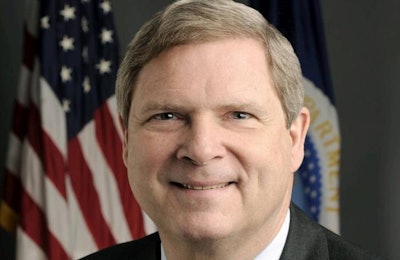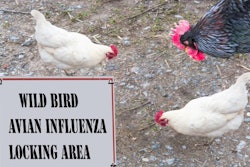
U.S. Secretary of Agriculture Tom Vilsack said the current outbreak of highly pathogenic avian influenza (HPAI) is not a severe as the outbreak of 2015, largely because of increased testing for the virus.
Vilsack served as agriculture secretary during the Barack Obama administration, when the earlier outbreak occurred, and he returned to the role during the Joe Biden administration.
He compared the experiences between the two outbreaks while speaking on February 24 at the United States Department of Agriculture (USDA) 98th Agricultural Outlook Forum.
“This is a circumstance and situation that we obviously had some experience with, but the experience that we're having today is significantly different than the experience we had the last time I had this job,” he said. “It is significantly less, and I think, in large part because we are essentially doing more testing. Getting more quick results, understanding that once results are confirmed the necessity of the population eradication. And that has happened in a number of instances already. Flocks have been depopulated in a number of states.”
Vilsack said there are “a handful of states” that are involved. The virus has struck commercial poultry flocks in Indiana, Kentucky and Delaware, while it has struck wild birds and backyard flocks in other states.
He also noted that the poultry industry has practiced strong biosecurity and is much more prepared for an HPAI outbreak that it was during the last major outbreak.
Likewise, flocks are quickly being quarantined and depopulated “to limit the risk.”
“I think the industry, both the turkey chicken poultry industry, has been very focused on making sure that producers understand the biosecurity components of protecting their flocks. I think the industry is much more prepared for this,” he said.
Implications on trade
Vilsack acknowledged that the detection of HPAI has had an impact on trade, but he is getting encouraging words that those restrictions in most cases will be limited.
“What we've seen from our trading partners is understanding the willingness to … essentially limit them to a particular state or particular region within a state, which is what we support,” Vilsack said.
Vilsack also indicated that, because many of the HPAI infections are in the wild and backyard birds that don’t enter the food supply, they should not be a consideration for trade restrictions.
Impact on prices
The HPAI outbreak during Vilsack’s previous tenure as agriculture secretary had a pretty substantial impact on the price of poultry and eggs. He doesn’t expect that situation to be as severe this time around.
“Many of the incidents that have been reported are sort of backyard flocks. They aren't necessarily commercial operations and a few commercial operations have been impacted. So this is significantly less at this point in time than what we experienced a number of years ago that did have an impact on prices and did have an impact on supply. I don't expect and anticipate (that), given where we are today we're going to see significantly significant impacts on the market,” he said.
View our continuing coverage of the global avian influenza situation.















